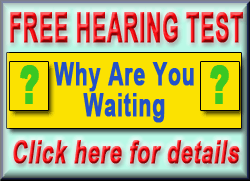8.
Antioxidants. Antioxidants and vitamin supplements may help
prevent hearing loss. Hearing loss due to aging may be prevented
with a combination of antioxidants, mineral and vitamin
supplements such as folic acid and magnesium. A healthy diet of
fruits and vegetables and meats may protect hearing in later
life.
9. Your heart. Maintain a healthy cardiovascular system. There
is a strong correlation between heart health and good hearing.
Newly published reports show that a healthy cardiovascular
system increases the likelihood of maintaining hearing,
particularly among older adults.
10. See an audiologist. If you think you may have hearing loss,
an audiologist will test, monitor and offer solutions to help
you function better. An audiologist is a licensed health care
provider who is trained to diagnose and manage your loss, as
well as offer preventative measures. To find an audiologist in
your area go to www.audiologyawareness.com or call (888)
833-EARS (3277).

The Audiology Awareness Campaign, a nonprofit foundation aimed
at providing the public with information on hearing loss, is
sponsoring the 4th Annual "Listen Up America Week" May 9 to 13,
2011, where audiologists will offer free hearing screenings
nationwide.
"By offering free hearing screenings throughout the United
States, we have the ability to reach many Americans who might
otherwise not have access to licensed audiologists," says Dr.
Kathy Landau Goodman, chairperson of the Audiology Awareness
Campaign. "Now these individuals will have access to
audiologists who can evaluate their hearing, determine whether
they have hearing loss, and then make appropriate
recommendations for treating their hearing problems."